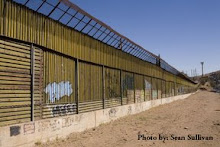The No Border Wall Coalition has signed on to the following letter urging members of the U.S. House of Representatives to support H.R. 2593, the Borderlands Conservation and Security Act. Signers include the Defenders of Wildlife, Sierra Club, World Wildlife Fund, Earthjustice, and a host of other organizations. While H.R. 2593 does not repeal the Secure Fence Act, it does repeal section 102 of the Real ID Act. This is the law that states, “Notwithstanding any other provision of law, the Secretary of Homeland Security shall have the authority to waive all legal requirements such Secretary, in such Secretary’s sole discretion, determines necessary to ensure expeditious construction of the barriers and roads under this section.” It gives Department of Homeland Security Secretary Chertoff the unchecked power to ignore the laws of our nation, and to waive those laws when homeowners, landowners, and environmentalists try to force DHS to obey them.
Dear Representative:
We urge you to cosponsor H.R. 2593, the Borderlands Conservation and Security Act. The
legislation amends existing border security laws which hinder strategic border security efforts and needlessly ignore environmental impacts and local communities.
The status quo mandates a weak border security mechanism and limits the Department of
Homeland Security (DHS): Currently, the Secure Fence Act requires DHS to construct a wall along non-continuous sections of the border between the U.S. and Mexico. Past experiences clearly show, border walls do not stop undocumented immigrants and drug smugglers. They just go around, climb over or dig under the wall. In addition, a rigidly mandated, one-size-fits-all border wall is inefficient and is an enormous waste of taxpayer dollars. Border security can and should be more strategic. H.R. 2593 would provide experts at DHS the ability to decide whether fences, vehicle barriers, or virtual fences would be most effective way to secure the border.
The status quo results in uninformed construction to the detriment of wildlife, citizens and border security: At present, section 102(c) of the Real ID Act grants the DHS Secretary broad and unparalleled authority to waive any and all federal, state and local laws when constructing barriers along the U.S. Border. As a result important considerations, such as blocking vital cross-border wildlife movement, are dismissed in the rush to waive laws and push forward with construction. Citizens, border security experts and land management agencies are all but cut out of the border security decisions. Citizens are denied the right to establish how border walls may devastate local economies dependant on ecotourism, legal international trade and good relations. Indeed, in the most recent waiver case in San Pedro Riparian National Conservation Area, citizens were denied the right to participate or inform the decision at all. HR. 2593 would give land management agencies, Native American tribes, and local communities a voice in border construction and decisionmaking.
The status quo threatens the nation’s commitment to the rule of law: DHS has invoked the Real ID Act waiver three times, waiving more laws with each successive use. Recently, in response to a court determination that DHS border wall construction violated the National Environmental Policy Act (NEPA), the Secretary waived not just NEPA but eighteen other laws as well, each of which was passed by Congress to protect public health, imperiled wildlife, or to guarantee citizens the right and a process to address arbitrary and capricious decisions of their government. And yet, each was waived without congressional oversight, a means of recourse for the public impacted, or any explanation. A notice was filed in the Federal Register and automatically nineteen laws were dismissed. Authorizing DHS to ignore all laws is no way to signal that the rule of law is to be respected. The president does not have the authority to waive laws at will, neither should an unelected official. We need an urgent and strategic solution to border security, not a reckless one which threatens the rule of law. H.R. 2593 would require compliance with laws meant to protect the air, water, wildlife, culture, and the health and safety of people in borderland communities.
We all support national security, and we can have intelligent security without harm to our precious borderlands, wildlife, and border communities. Again, we strongly urge you to Cosponsor H.R. 2593, and support its passage by the U.S. House of Representatives.
Tuesday, February 12, 2008
Subscribe to:
Posts (Atom)


